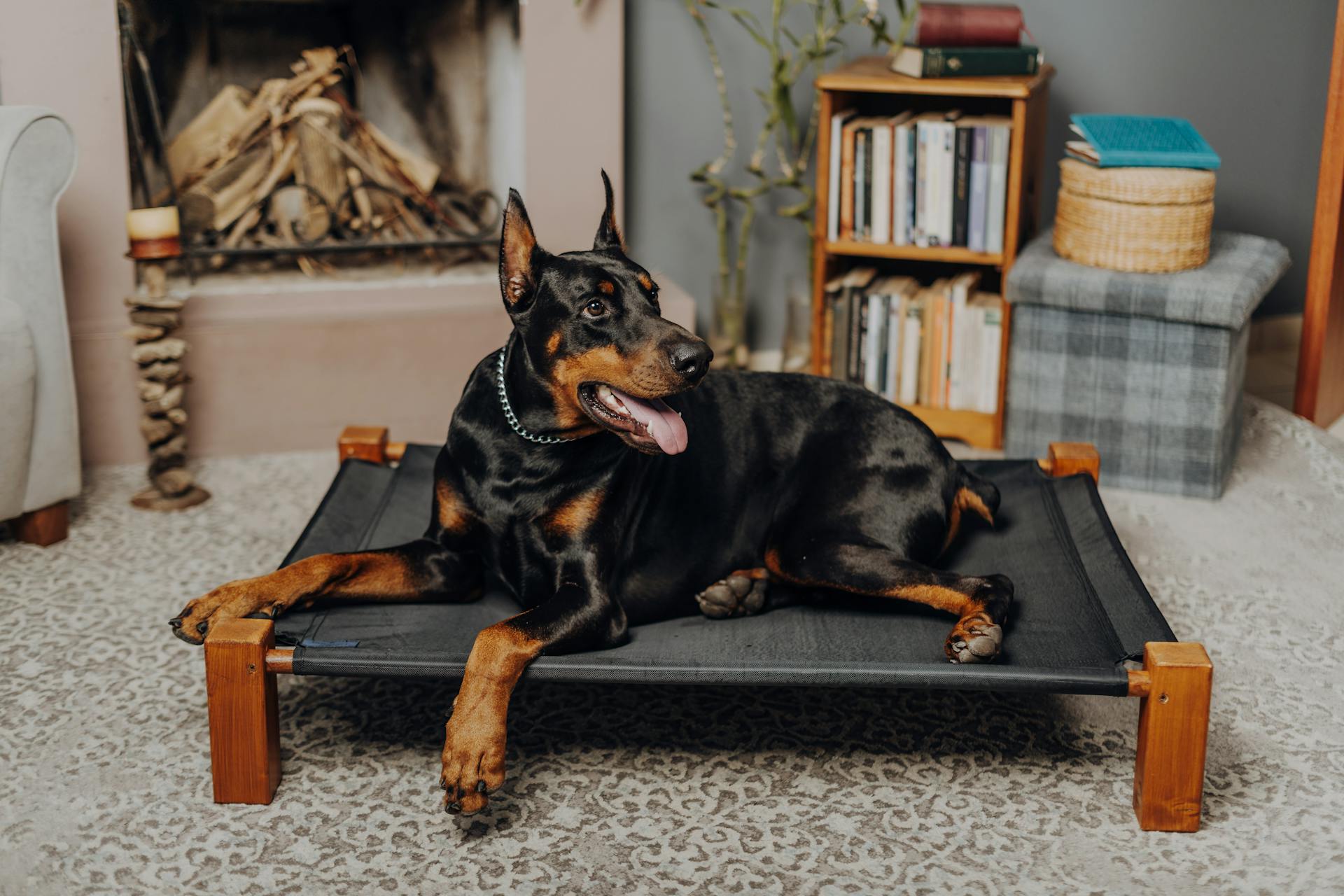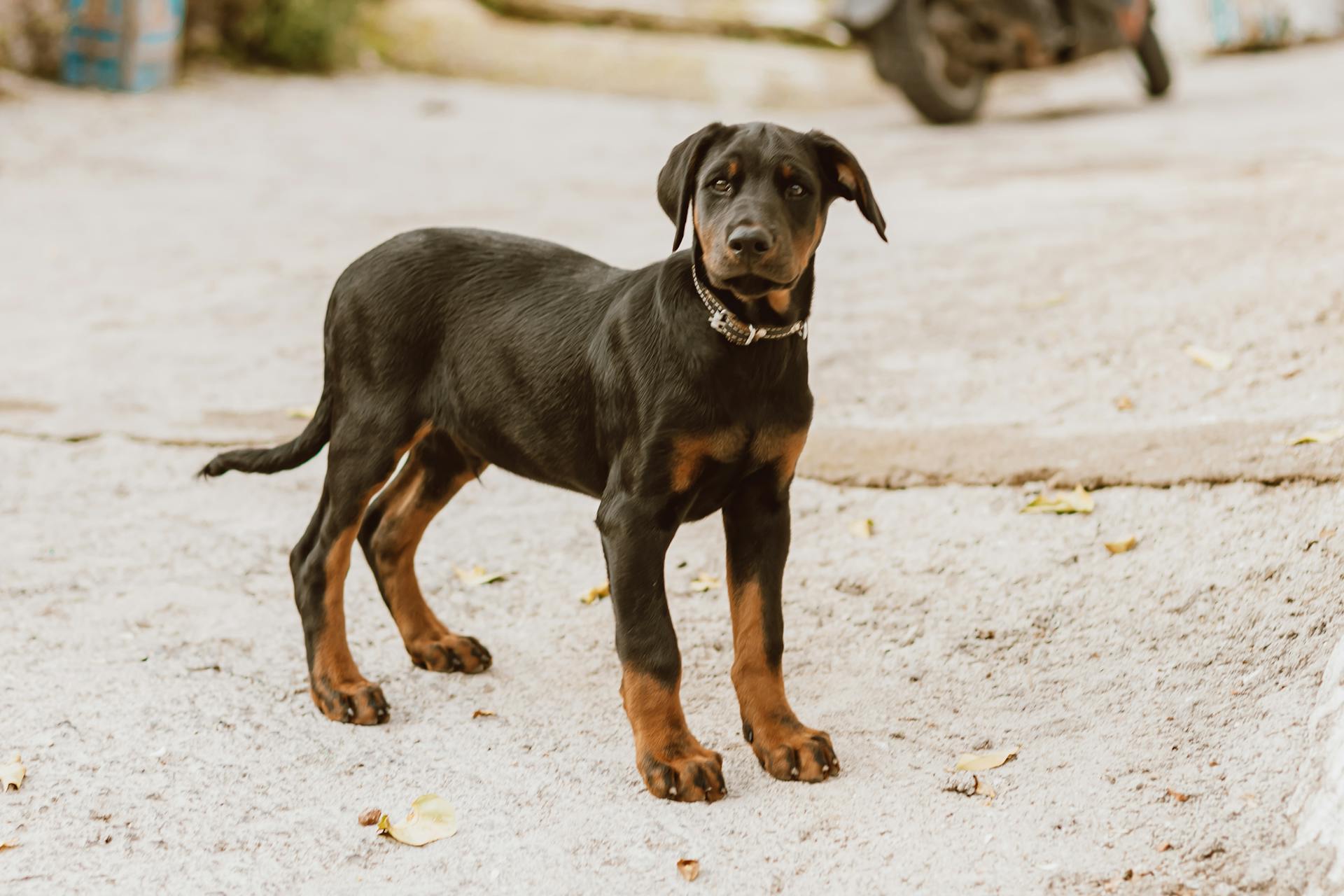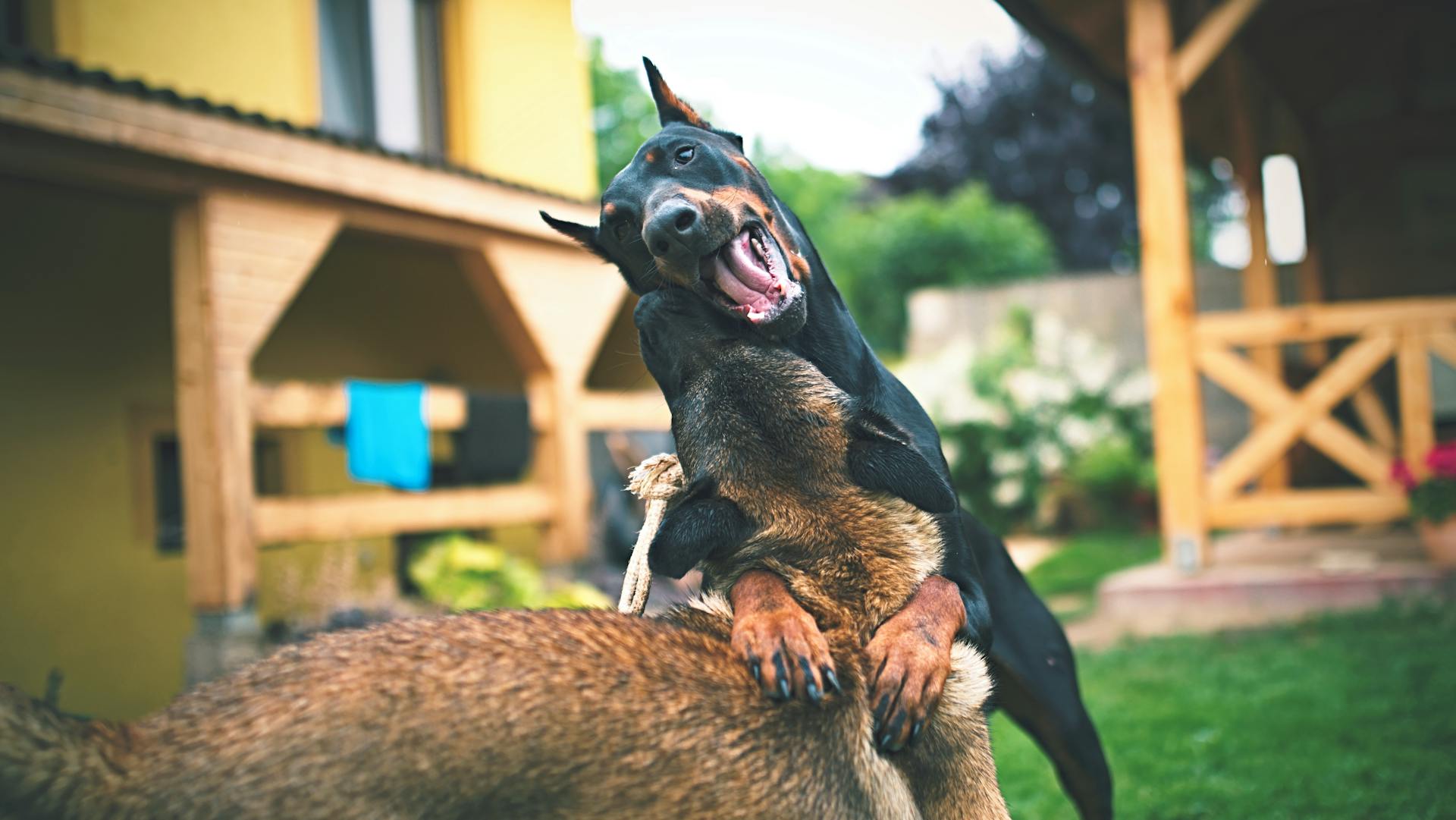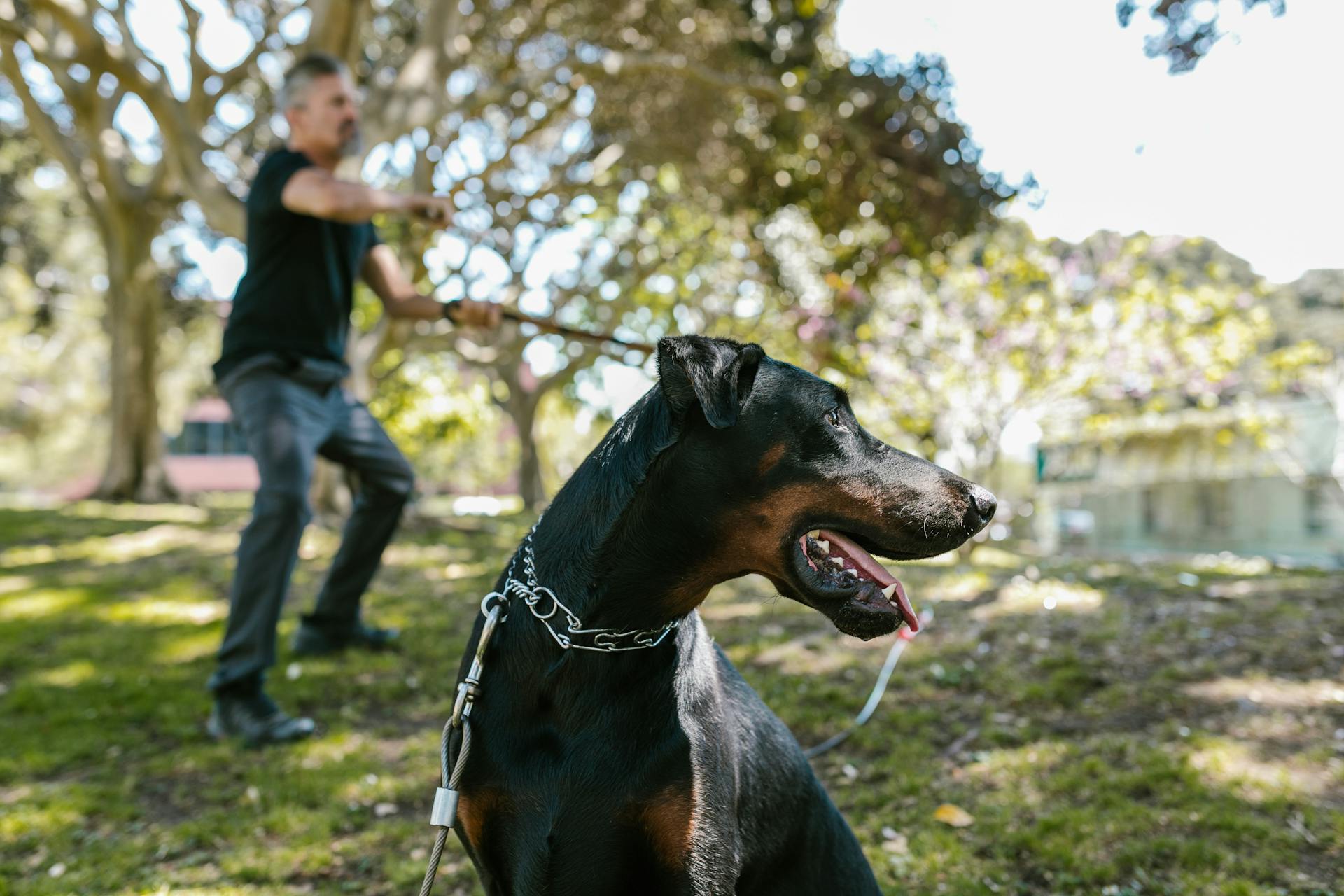
Doberman Pinschers can make wonderful family dogs, but it's essential to consider their needs and characteristics before making a decision. They are highly intelligent and active dogs that require regular exercise and mental stimulation.
Doberman Pinschers are naturally protective of their families, which can be a double-edged sword. On one hand, they can be excellent watchdogs, but on the other hand, they may be wary of strangers and require time to warm up to new people.
Their loyalty and affection towards their families are renowned, but this also means they can suffer from separation anxiety if left alone for extended periods. This makes it crucial for potential owners to consider their work schedules and living arrangements before bringing a Doberman into their home.
Overall, with proper care and attention, Doberman Pinschers can thrive as beloved family pets.
General Temperament
Doberman Pinschers are known for their unique blend of intelligence, loyalty, and protective instincts. They're often referred to as "velcro dogs" because of their tendency to stick close to their family members.
Dobermans are highly intelligent, consistently ranked among the top five smartest dog breeds in the world. They're easily trainable, but also easily bored, making them a great fit for active families.
Their loyalty is unmatched, and they'll bond strongly with one family member, often becoming their closest companion. They're also very adept at reading human behavior and will adapt their actions accordingly.
Dobermans are naturally protective of their family, but with proper socialization and training, they can learn to coexist peacefully with children. In fact, they're often described as "people dogs" that thrive on attention and affection.
One thing to keep in mind is that Dobermans can be quite large, and their size can be intimidating to young children. However, with proper introduction and socialization, they can become gentle giants.
Here are some key temperament traits to consider:
- Highly intelligent and trainable
- Loyal and protective of their family
- People-oriented and affectionate
- May be wary of strangers, but can learn to trust with proper socialization
Overall, Doberman Pinschers can make wonderful family dogs for active families who are willing to provide the necessary attention, exercise, and training. With patience, love, and proper care, they can become loyal and loving companions.
Family Unit
If you have kids, it's essential to train your Doberman from the beginning and provide proper socialization to ensure he's a wonderful family pet.
A Doberman Pinscher is extremely loyal to his family, and with early introduction to the family unit, he can view your kids as part of his pack.
A Doberman Pinscher is a fantastic guard dog that will be the ultimate protector for your kids, but this also means he has a strong drive to protect his property, family, and himself.
To raise a Doberman puppy in a household with young children, it's crucial to supervise interactions at all times to avoid behavioral problems or a fear of dogs in either the dog or the children.
Here are some basic rules to follow:
- Never allow the puppy and children to play unsupervised.
- Do not allow intense screaming or “out of control” play while interacting with the puppy.
- Ensure the puppy always has a means of escape to leave a situation.
- Never allow your children to engage in play biting or nipping games with the puppy.
- Teach your children how to play gently and responsibly with the puppy.
- Provide plenty of Doberman appropriate dog toys and other objects for the puppy to bite on during playtime.
- Never allow the children or the puppy to be in a situation where they’re frightened.
If you're willing to put in the necessary work, raising a Doberman puppy in a household with children can be quite beneficial for both the dog and the kids.
Exercise and Activity
Dobermans need lots of exercise to be happy and relieve stress, so if your family is active and loves outdoor activities, a Doberman would be a great fit.
They require at least 2 hours of exercise each day, which can be achieved by taking them on long walks, jogs, or engaging in training classes like agility and tracking.
Providing your pup with fun toys that help keep them engaged and stimulated is also a big plus, as it will help keep them mentally active and curious.
Your kids can help with exercise by playing with the Doberman in a backyard or engaging in outdoor games, which will not only benefit the dog but also help your kids get at least one hour of exercise.
Exercise Requirements
Dobermans need lots of exercise to be happy and relieve stress.
If your family is active and enjoys outdoor activities like walks, bike rides, or hiking, a Doberman would be a great fit.
A Doberman needs a lot of exercise, both physically and mentally, to stay healthy and stimulated.
Providing your pup with fun toys that keep him engaged, like the Rolly Cannoli, is a great way to give him mental stimulation.
A Doberman needs around 2 hours of exercise each day, which can be challenging, but it's essential for their well-being.
You can help your Doberman get the exercise they need by running around with them in your backyard, making playtime a fun and interactive experience for both you and your kids.
Dobermans love to swim, and it's a great way to provide them with physical exercise and mental stimulation.
By incorporating a variety of exercise activities into your Doberman's routine, you can help them stay happy, healthy, and well-adjusted.
Size
A Doberman Pinscher's large size means they need plenty of exercise to stay happy and healthy.
They stand anywhere from 24 to 28 inches tall, which is quite a towering figure.
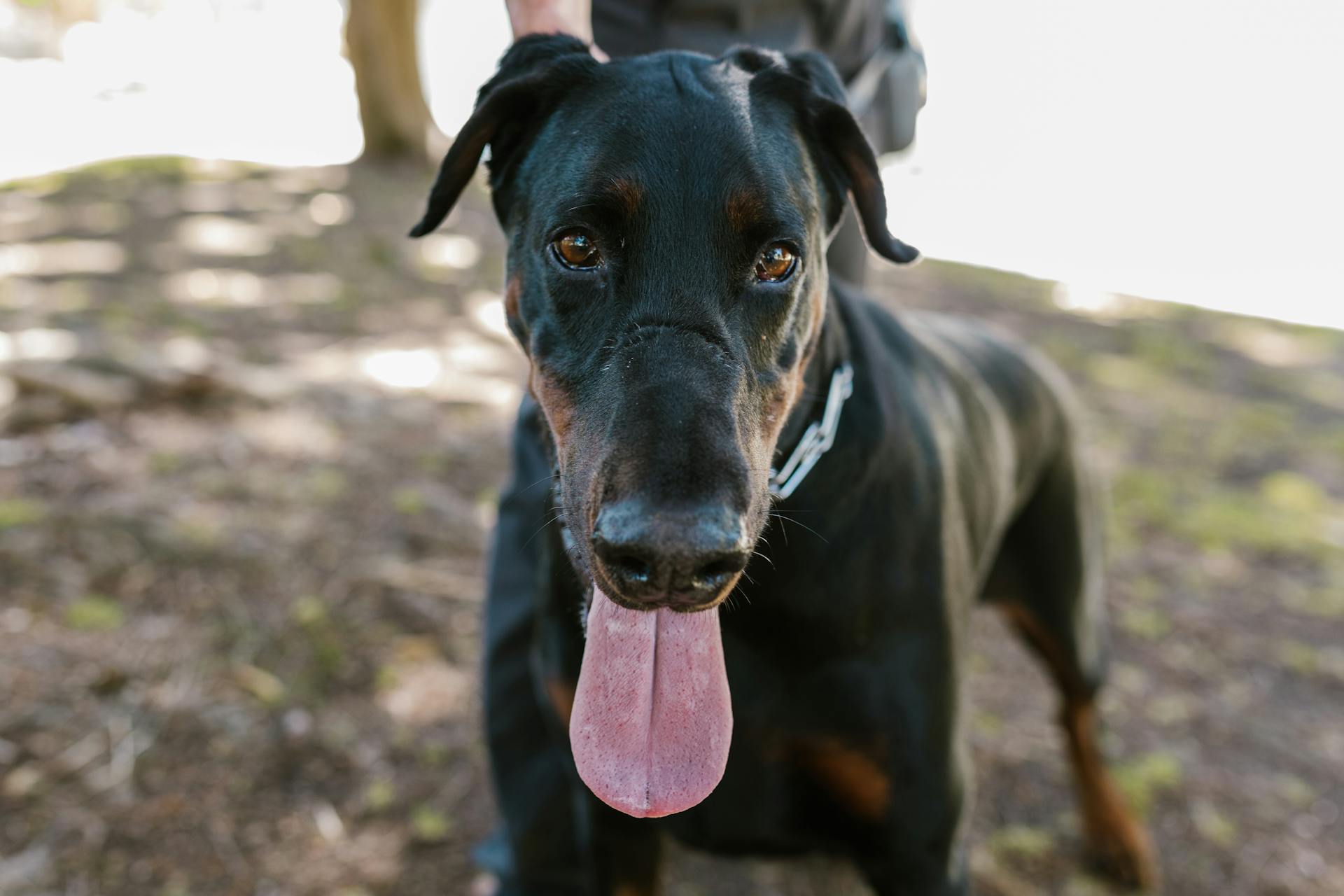
Males usually fall within the higher end of both height and weight, making them even more impressive.
Their sleek, muscular physique is a testament to their athletic ability and endurance.
Regular exercise can help burn off excess energy and keep your Doberman's weight in check, which is crucial for their overall health.
You might enjoy: Average Weight for Doberman Pinscher
Socialization and Training
Early socialization is key to raising a well-rounded Doberman. They're naturally curious, so introduce them to as many situations, people, and other animals as possible when they're young.
Socializing your Doberman with kids is especially important. One owner's experience shows that exposing their puppy to kids and teaching them to tolerate kids' rough play helped their Doberman become gentle and tolerant.
To develop into well-mannered family dogs, Dobermans need early socialization and training. This can include taking them to the dog park, family gatherings, or enrolling them in puppy classes.
Intriguing read: Doberman Pincher Puppies
Early Socialization is Key
Early socialization is key to raising a well-rounded and gentle Doberman. This is especially true when it comes to kids, as a young puppy will get used to being petted, pulled on, and even having hands inserted into their food bowl.
Introducing your Doberman to various situations, people, and other animals from a young age is crucial. Take them to the dog park or to family gatherings with lots of people to help them become confident in new environments.
Early socialization can also help prevent behavioral problems, such as aggression or fearfulness, in Dobermans. Exposing kids to a variety of people, places, and experiences can make a big difference.
By socializing your Doberman early and often, you'll reap the rewards of a loving and tolerant dog later. This means they'll be less likely to become protective over their food or toys.
Take your Doberman swimming or enroll them in puppy classes to help them become well-rounded adults. The more experiences you provide for them, the better equipped they'll be to handle new situations.
Training
Positive reinforcement training techniques are effective with Dobermans. Consistent instruction is essential for kids to develop into well-behaved adults.
Early socialization is crucial for Dobermans to become well-adjusted adults.
Intriguing read: Are Dobermans the Best Guard Dogs
History and Basics
Doberman Pinschers have a rich history dating back to the late 19th century.
Their origins can be traced back to Karl Friedrich Louis Dobermann, a German tax collector who bred them as guard dogs.
Doberman Pinschers were originally bred to be intelligent, loyal, and athletic dogs.
They quickly gained popularity as police and guard dogs due to their intelligence and protective nature.
A unique perspective: Doberman Pinscher Protection Training
History of Doberman Pinschers
The Doberman Pinscher has a rich history that dates back to the 19th century. Karl Friedrich Louis Dobermann, a German tax collector, bred the first Doberman Pinschers as guard dogs.
Dobermann's goal was to create an intimidating, intelligent, and loyal dog. He selected dogs from his pound with these desirable traits to breed the modern Doberman Pinscher.
Tax collectors like Dobermann were often feared for their physical safety, which is why he needed a dog that could protect him. The breed's intimidating nature was likely a result of Dobermann's breeding goals.
The exact breeds that made up the original Doberman Pinscher are unknown, but the German Shepherd and a now-extinct variety of the German Pinscher are suspected to have played a significant role in the breed's genetic makeup.
A fresh viewpoint: Are German Shepards Good Dogs
Families: Essential Basics
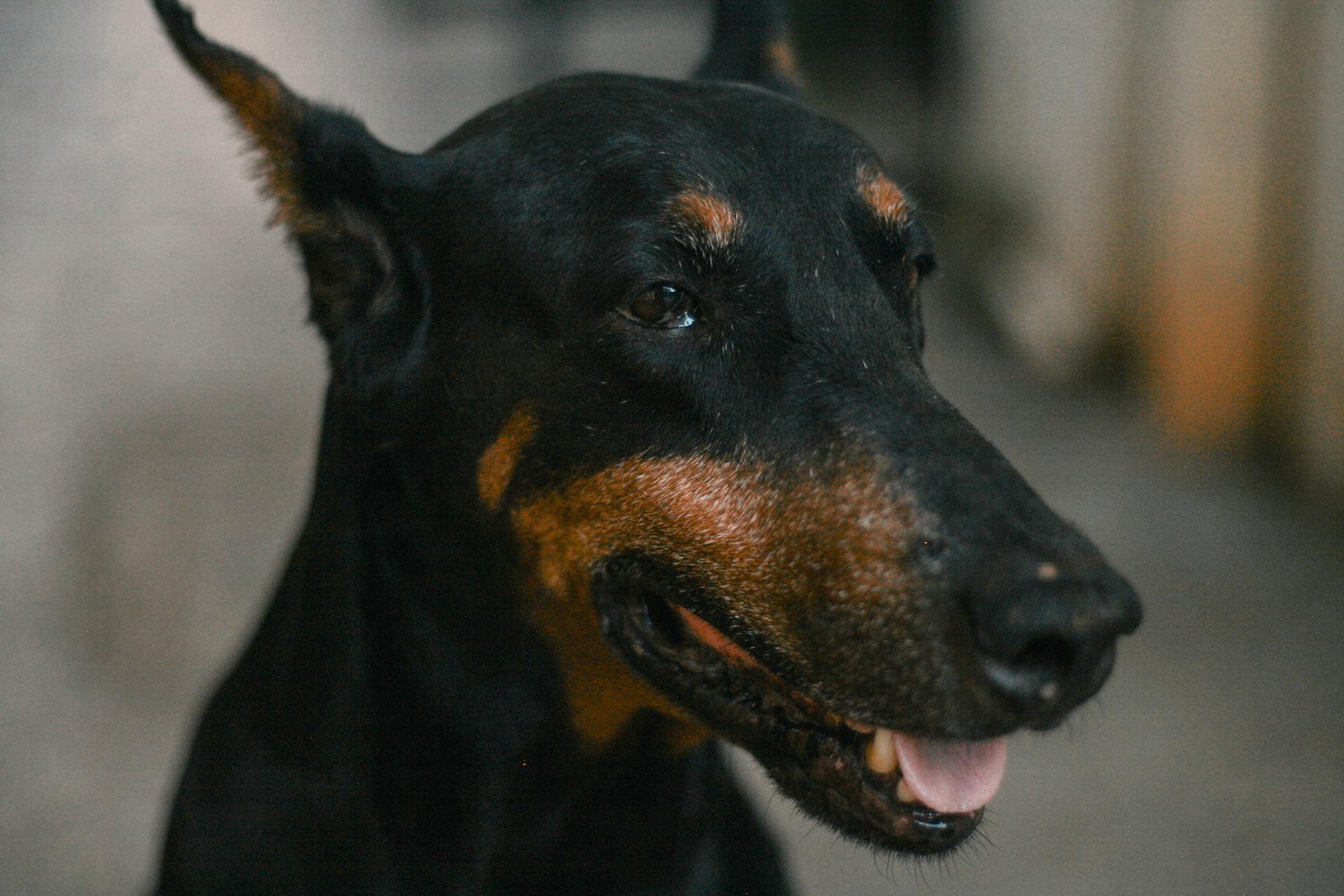
Families with young children need to be aware of the potential dangers to both the dog and the children when introducing a Doberman puppy to the household. Doberman puppies can be hyper with sharp claws and teeth, and children can scream and act out in unpredictable ways.
It's essential to never allow the puppy and children to play unsupervised, as this can lead to behavioral problems in the dog or a fear of dogs in the children.
To ensure a harmonious household, never allow intense screaming or out-of-control play while interacting with the puppy. This can be overwhelming for the puppy and create a negative association with playtime.
Doberman puppies need a means of escape to leave a situation, so ensure they always have a way to retreat if needed. Cornering or restraining the puppy can be stressful and potentially lead to behavioral issues.
Teach your children how to play gently and responsibly with the puppy by setting a good example and guiding them during playtime. Playtime should never be a free-for-all, but rather a supervised and enjoyable experience for both the puppy and the children.
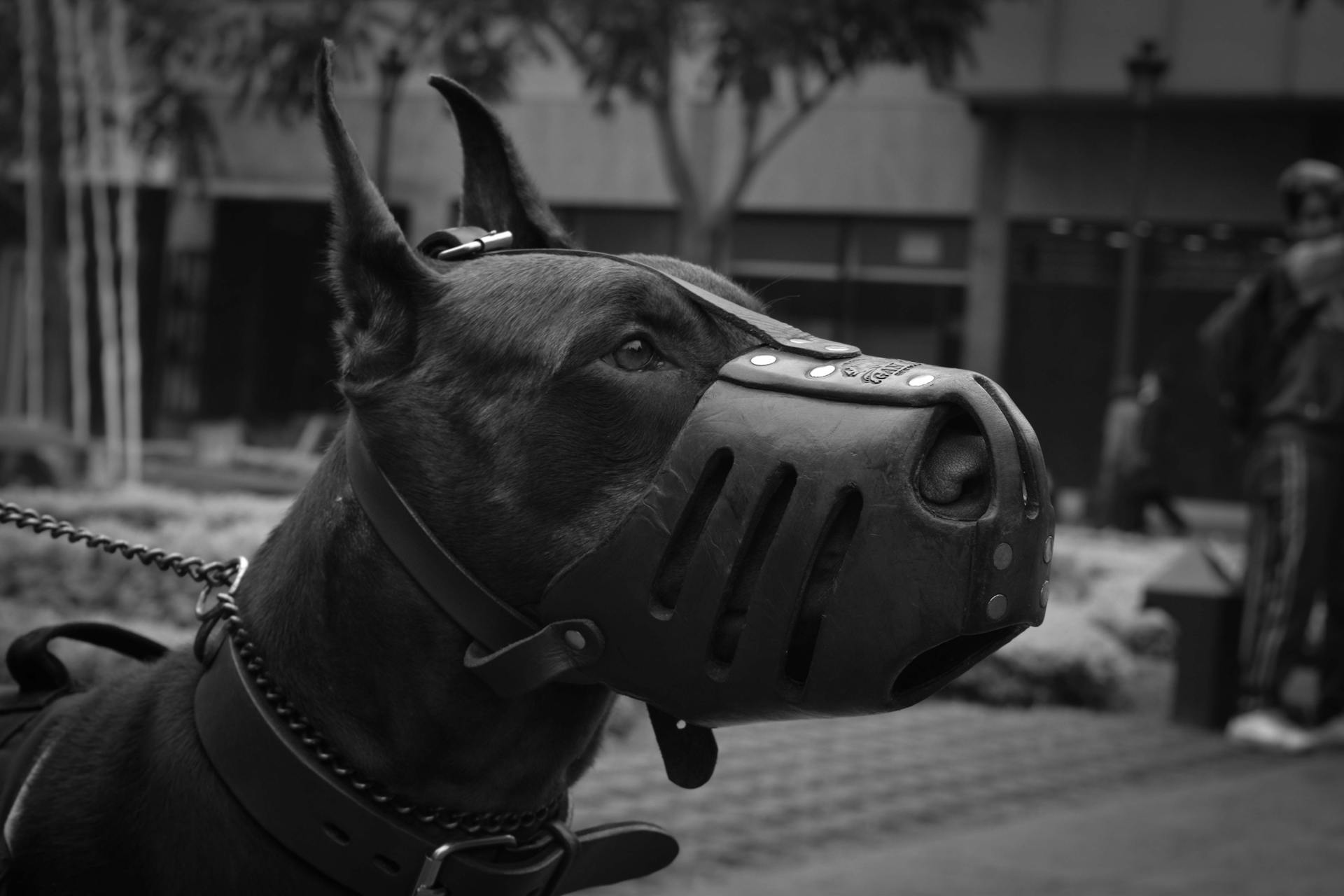
Provide plenty of Doberman-appropriate dog toys and other objects for the puppy to bite on during playtime. This can help redirect their energy and prevent unwanted behaviors.
Here are some basic rules to follow when raising a Doberman puppy in a household with young children:
- Never allow the puppy and children to play unsupervised.
- Do not allow intense screaming or “out of control” play while interacting with the puppy.
- Ensure the puppy always has a means of escape to leave a situation.
- Never allow your children to engage in play biting or nipping games with the puppy.
- Teach your children how to play gently and responsibly with the puppy.
- Provide plenty of Doberman-appropriate dog toys and objects for the puppy to bite on.
- Never allow the children or the puppy to be in a situation where they’re frightened.
Doberman Pinscher Characteristics
Doberman Pinschers have a reputation for being aggressive, but what does the reality of their temperament look like? They are actually highly intelligent and loyal dogs.
Doberman Pinschers are often misunderstood, but they are generally good with children if socialized properly.
Their short coats require minimal grooming, making them a great choice for busy families.
Doberman Pinschers are naturally athletic and need regular exercise to stay happy and healthy.
Despite their intimidating appearance, Doberman Pinschers are often described as " Velcro dogs" because of their strong desire for human companionship.
Potential Concerns
Doberman Pinschers are naturally protective of their families, which can sometimes lead to aggression towards strangers. This can be a challenge for families with young children who may not understand the importance of approaching strangers with caution.
Their high energy levels require regular exercise and mental stimulation, which can be a concern for families with busy schedules. As we've seen, Doberman Pinschers need at least an hour of exercise per day.
Their strong prey drive can make them prone to chasing small animals, which may not be suitable for families with pets that are small enough to be considered prey. In our discussion on training, we touched on the importance of socialization to help curb this instinct.
Their intelligence and loyalty can sometimes make them wary of new people and environments, which can lead to anxiety and stress. This is especially true if they haven't been properly socialized from an early age.
Their large size and strength require careful consideration when it comes to living arrangements, as they need plenty of space to move around and exercise.
Frequently Asked Questions
Is a Doberman a good house dog?
A Doberman can make a great house dog with proper training and an active household, but may not be suitable for families with young children due to their size and energy level.
What are the cons of owning a Doberman Pinscher?
Owning a Doberman Pinscher comes with potential cons, including separation anxiety, same-sex aggression, health problems, and the stigma surrounding the breed. Before bringing a Doberman home, it's crucial to carefully consider these factors to ensure a harmonious and healthy relationship.
Are Dobermans safe with kids?
Due to their high energy and rambunctious nature, Dobermans may not be the best fit for families with young children. Consider waiting until your kids are older before bringing a Doberman into your family
What are Dobermans behavior problems?
Dobermans are prone to behavior problems such as separation anxiety and destructive behavior due to lack of activity. This can lead to barking and chewing issues that require attention and training to resolve.
Sources
- https://www.dobermanplanet.com/are-dobermans-good-family-dogs/
- https://neaterpets.com/blogs/news/why-doberman-pinschers-are-the-best-family-dog
- https://www.dobermanplanet.com/are-dobermans-good-with-kids/
- https://www.hepper.com/are-dobermans-good-family-dogs/
- https://www.newyorkdognanny.com/dog-productsservices-to-make-your-life-easier/are-dobermans-good-family-dogs/
Featured Images: pexels.com
